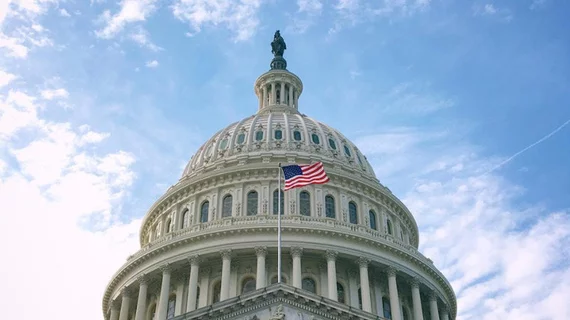Radiologists speak during Capitol Hill briefing on key breast imaging legislation
Three radiologists were among those speaking during a Capitol Hill briefing held Monday in Washington as advocates attempt to drum up support for a key piece of imaging-related legislation.
U.S. Rep. Rosa DeLauro, D-Conn., convened the hearing a day before new FDA breast density notification requirements were set to go into effect on Sept. 10. The longtime congresswoman reintroduced the Find It Early Act alongside Rep. Brian Fitzpatrick, R-Penn., in May 2023.
Endorsed by others such as breast cancer survivor Katie Couric, the legislation would require all insurers to cover supplemental breast imaging exams. Though the bill boasts bipartisan backing in the House, advocates note that it has had difficulty finding a Republican supporter in the Senate.
“While this nationwide standard is critical to informing women about their breast density, there is more work to be done,” DeLauro said in a message about the hearing emailed to colleagues and constituents. “Most insurance does not cover additional screenings like ultrasounds or MRIs after a mammogram, even though these screenings are more likely to find cancer. As a result, women will then have to pay as much as thousands of dollars out-of-pocket if they want to be screened, which many will likely be forced to forgo as a result.”
Those testifying Sept. 9 included Peter Eby, MD, division chief of breast radiology at Penn Medicine; Rachel Brem, MD, of Maryland, founder of the Brem Foundation to Defeat Breast Cancer; and Michael Ulissey, MD, an adjunct professor at the University of Texas Health Science Center and Rayus Radiology physician.
Ulissey spoke with Radiology Business Monday morning ahead of the hearing, noting that “all too often” he has heard stories about costs derailing cancer care. In one instance, a 40-year-old woman came to his clinic with a lump on her breast the size of a walnut. He asked when she had noticed the mass, and the woman said it had been four months, with it starting out the size of a pea.
“I said, I don't want you to misinterpret this question, but what took you so long to get in? Because I want to make sure it wasn't my administrative system that thwarted you and you called and they said, we can see you in four months,” Ulissey said by phone. “She said, oh no. They said they could see me the next day, but my insurance company told me I had a $300 copay, and it took me four months to save for it.”
Ulissey noted that, under the Affordable Care Act, screening mammograms are covered free of charge. However, many insurers do not pay for follow-up diagnostic exams such as MRI and ultrasound. States have pushed to fix this coverage gap, with Alaska recently becoming the 26th to pass legislation. Ulissey helped advocate for this legislative fix in Texas, Oregon and Washington state. But with imaging providers now required to notify women about dense breast tissue—and some requiring MRIs as a follow-up step—he believes it make sense to enact this change at the federal level. MRI and ultrasound are simply an “extension of the screening study,” he emphasized.
“Why go around and redo this 50 times if we can get it done once on a national level? That's the reason I'm here,” Ulissey said.
Breast imaging AI vendor Volpara Health promoted the hearing in a blog post shared on Aug. 23. The company highlighted challenges advancing the legislation in the upper chamber.
“Despite the clear need and bipartisan support in the House, we have been unable to secure a Republican co-sponsor in the Senate,” wrote Andrea Wolf, advocate and Volpara policy advisor. “The resistance is often rooted in the broader philosophical debate about federal versus state mandates and spending more federal dollars.”
Sheila Mikhail, JD, MBA, executive director of the Columbus Children’s Foundation and co-founder/CEO of AskBio, also spoke during the briefing. She for years attended regular mammography screenings that did not discover cancer. But in November 2022, less than a year after receiving an “all clear” exam, Mikhail discovered a small dimple. Follow-up exams including ultrasound, a biopsy and MRI revealed she had the disease, with Mikhail undergoing radiation treatment and a double lumpectomy.
“I was told that it was my fault because I hadn’t asked for the right test,” she told attendees on Monday. “I am hell bent and determined to make sure that, in my state, women won’t be put in that position and that they have access to these tests,” she added later.
Rep. DeLauro called the launch of breast density notifications on Tuesday a “major victory for women everywhere.” However, she believes it only marks a “first step.”
“For me, the next step is we have to mandate that insurance covers screenings and diagnostic mammograms, breast ultrasounds and breast MRIs with no cost-sharing, nationwide,” DeLauro told attendees. “It’s imperative that women, regardless of where they live or their insurance, have access to what are critical screenings without any additional costs.”
“We’ve scored a victory,” the ovarian cancer survivor added later. “But the campaign for early detection goes on and on and on. We must pass the Find It Early Act. Women’s lives are at stake, and we can’t take that lightly. You have my word that I will fight like hell to get this bill passed. I’m grateful for all of you hear today but we need your voices, your networks in order to put the pressure on this institution to do what it needs to do.”

